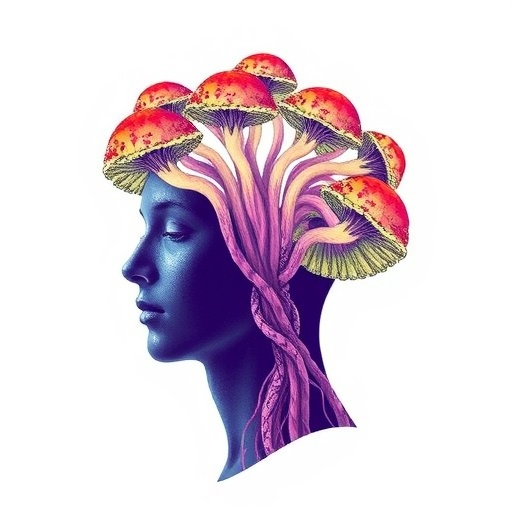In the wake of the COVID-19 pandemic, frontline healthcare workers have grappled with unprecedented levels of psychological distress, manifesting in widespread depression and burnout. Recognizing the urgent need for innovative therapeutic interventions, researchers at the Huntsman Mental Health Institute at University of Utah Health have conducted a pioneering study exploring the efficacy of combining psilocybin-assisted group psychotherapy with a structured program of mindfulness-based stress reduction (MBSR). This randomized controlled trial offers compelling evidence for a novel treatment paradigm that could revolutionize mental health care for healthcare professionals enduring the long-term psychological impacts of the pandemic.
The study enrolled 25 healthcare providers directly involved in COVID-19 patient care who were diagnosed with significant levels of depression and clinical burnout. These frontline workers were randomized to either receive an eight-week MBSR program alone or the same mindfulness intervention supplemented by a single, controlled dose of psilocybin administered in a group therapy setting. Psilocybin, a naturally occurring psychedelic compound, has garnered increasing attention for its potential to alleviate treatment-resistant depression through its profound effects on neural connectivity and emotional processing.
Unlike traditional psilocybin trials that often involve individual therapy sessions with multiple therapists per patient, this investigation employed a group therapy model. By delivering psilocybin-assisted psychotherapy in group sessions, the researchers have demonstrated a scalable and cost-effective approach that can facilitate broader access to psychedelic-assisted treatment, a critical consideration given the overwhelming mental health support demands among healthcare workers.
The findings were striking. Participants receiving the combination psilocybin and mindfulness therapy exhibited a reduction in depression severity scores that was more than double that observed in the mindfulness-only group. Beyond alleviating depressive symptoms, these individuals also reported marked decreases in emotional exhaustion—a core component of burnout—and experienced enhanced feelings of connection to self and community. Such improvements underscore the potential for this combined therapeutic approach to address not only the neurochemical aspects of depression but also the existential and relational dimensions of burnout.
Notably, nearly half of the participants—46%—who underwent the combined therapy protocol achieved remission from depression at the two-week post-treatment assessment. In stark contrast, only 8% of those receiving mindfulness training alone reached a similar endpoint. This disparity highlights the transformative impact of integrating psilocybin into psychosocial interventions and underscores the need for further investigation into its mechanisms and long-term benefits.
The therapeutic effects of psilocybin are thought to arise from its agonism at serotonin 2A receptors, which facilitates transient alterations in brain network connectivity, particularly within the default mode network. These neurophysiological changes may disrupt maladaptive rumination and promote cognitive flexibility, thereby enabling patients to reframe negative thought patterns—a hypothesis supported by neuroimaging studies. When combined with mindfulness practices that cultivate present-moment awareness and emotional regulation, psilocybin-assisted therapy may offer a synergistic pathway to psychological healing.
Burnout and depression among healthcare workers have reached crisis levels, exacerbated by the relentless stresses of the pandemic including high patient mortality, resource scarcity, and prolonged work hours. Traditional treatment options, primarily pharmacological antidepressants and psychotherapies, often fail to yield rapid or sustained relief. This study’s demonstration of rapid symptom improvement following a single psilocybin session, in combination with structured mindfulness training, presents a promising alternative for clinicians and policymakers aiming to ameliorate the mental health crisis within healthcare systems.
While the results are encouraging, the researchers acknowledge the limitations of their trial, including a modest sample size and the need to validate findings across diverse healthcare settings and populations. Moreover, careful attention to dosing protocols, setting, and psychological support remains essential to ensure safety and maximize therapeutic outcomes when using psychedelic compounds in clinical practice.
Future research directions include longitudinal studies to assess the durability of therapeutic effects, exploration of underlying neurobiological mechanisms through functional neuroimaging, and comparative trials to optimize treatment parameters. Additionally, integrating such treatments into mainstream healthcare requires addressing regulatory challenges and training a workforce skilled in administering psychedelic-assisted therapies within ethical and evidence-based frameworks.
This study advances the growing field of psychedelic medicine by demonstrating the feasibility and efficacy of group-based psilocybin-assisted psychotherapy augmented with mindfulness training for healthcare workers profoundly affected by COVID-19-related psychological trauma. As the pandemic continues to reshape global health priorities, such innovative approaches may pave the way for scalable interventions addressing not only healthcare provider wellbeing but also broader public mental health challenges.
The implications of these findings resonate beyond the immediate clinical context. They challenge prevailing paradigms about the treatment of depression and burnout, suggesting that interventions fostering profound psychological insight and connectivity could yield superior outcomes compared to conventional modalities. By empowering patients to engage actively in their recovery through mindfulness practices paired with psychedelic facilitation, this dual approach offers a compelling model of holistic mental health care.
The work led by Dr. Benjamin Lewis and his team at University of Utah Health exemplifies the cutting-edge intersection of psychiatry, neuroscience, and mindfulness studies. Their commitment to exploring safe, inclusive, and accessible mental health innovations sets a new benchmark for addressing the urgent needs of those on the frontlines of healthcare, who have borne the brunt of the pandemic’s emotional toll.
For clinicians, researchers, and healthcare administrators alike, these findings illuminate an emerging therapeutic frontier. Harnessing the restorative potential of psilocybin within structured group therapies complemented by mindfulness training holds promise not only for alleviating current suffering but also for fostering resilience and psychological flourishing in the face of future healthcare crises.
Subject of Research: People
Article Title: Psilocybin-assisted group psychotherapy and mindfulness-based stress reduction for frontline healthcare provider COVID-19-related depression and burnout: A randomized controlled trial
News Publication Date: 19-Sep-2025
Web References:
https://journals.plos.org/plosmedicine/article?id=10.1371/journal.pmed.1004519
References:
Lewis, B. R., et al. “Psilocybin-assisted group psychotherapy and mindfulness-based stress reduction for frontline healthcare provider COVID-19-related depression and burnout: A randomized controlled trial.” PLOS Medicine, 19 Sep 2025. DOI: 10.1371/journal.pmed.1004519
Image Credits:
Charlie Ehlert / University of Utah Health
Keywords:
Alternative medicine, Mental health, Depression, COVID 19




